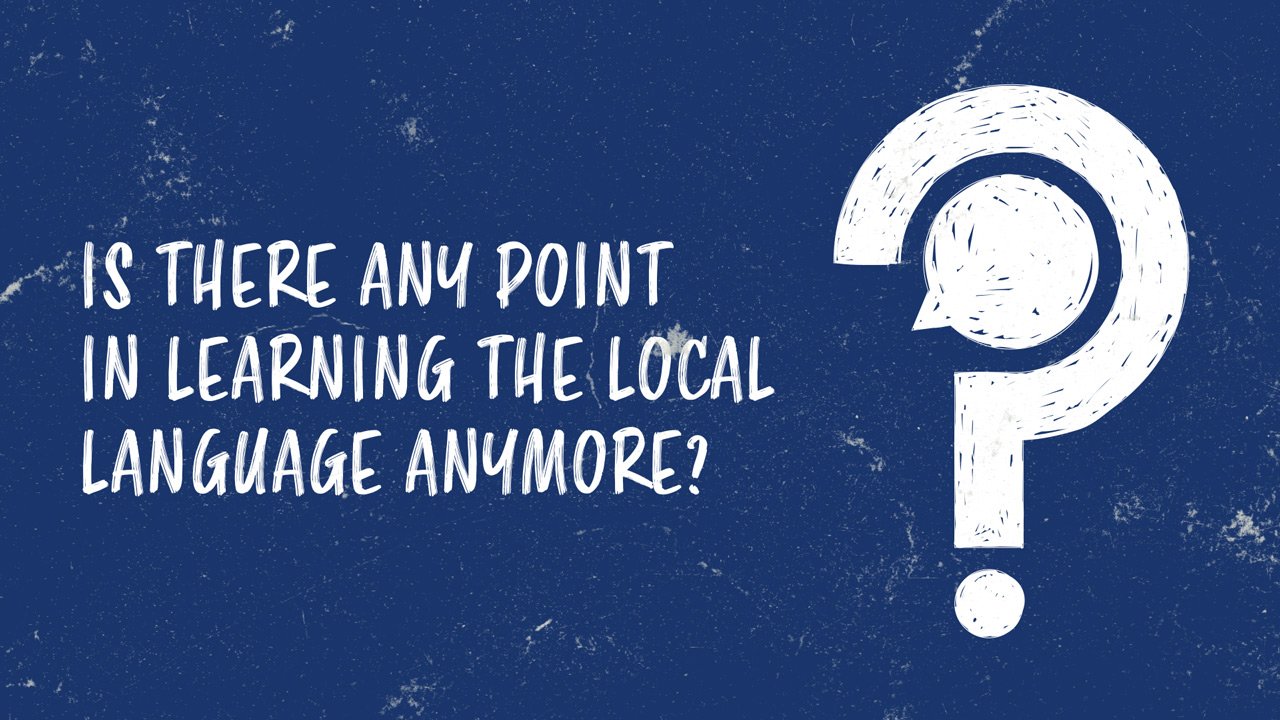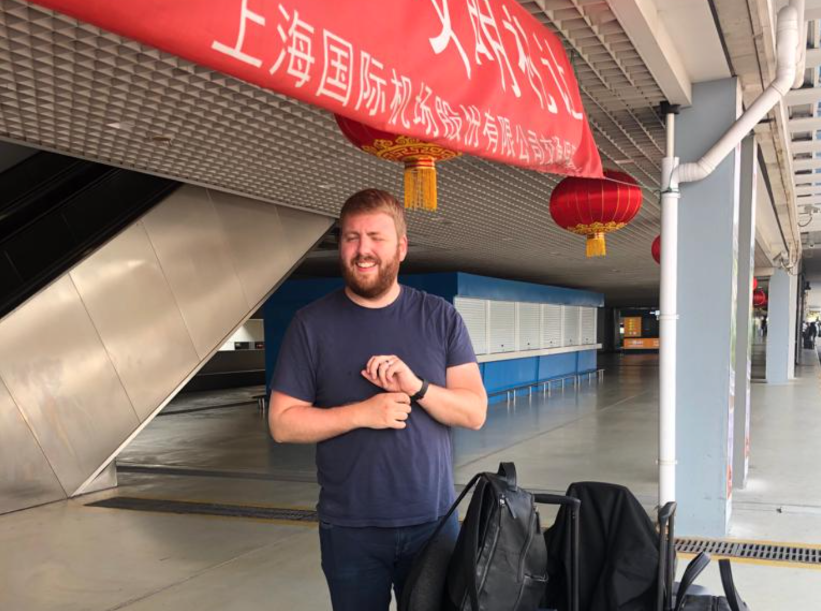Is There Any Point In Learning The Local Language Anymore?
In 2019, my wife and I went on honeymoon. She wanted a Maldivian beach. I wanted to eat dumplings overlooking Victoria Harbour. I won.
Hong Kong was easy. Japan too. Even South Korea had been a breeze. But, as I had been warned, not a single person in Shanghai Pudong International Airport was able to point me towards the pick up point where my pre-booked driver was apparently waiting. Every time I asked politely where I could find the strange symbols on my phone screen, I was met with a shrug or a shake of the head.
It wasn’t rudeness, or that they didn’t have time. It was simply down to the fact that nobody I asked spoke English. That being said, I did speak English when I got into the center of Shanghai, and the staff at my hotel spoke perfect English, so maybe I was just unlucky. But it was definitely tougher to find English speakers, even in a multinational city like Shanghai.
I continued to wander, the English-language signs that were only recently installed doing me about the same favours as the Chinese-language ones. More shrugs. I feared my driver would lose patience and leave.
Then, another kindly taxi driver pulled out his phone, and opened an app. He typed something in, then a couple of seconds later, the Alexa-imitation voice asked me where I wanted to go. After some conversation back and forth via the app, we agreed I didn’t need his services, and he pointed me towards the pick-up point, where my driver, also armed with an instant translation app, was waiting.
Although the conversation was thin on the ground, he would often type something onto the screen in front of him, my heart jumping as he swerved a couple of times on Shanghai’s eight-lane highways. He asked me where we were from, what we had planned, and if he could drop us off around the corner from the hotel so he didn’t get caught in the city’s disgusting traffic.
After three weeks of travelling around the Far East, this was the first time I’d encountered any form of language barrier, and even then the problem was solved within seconds. The app was faultless. I can honestly say I didn’t have to get him to type it again, or that I didn’t understand. I wish I knew what it was called, as it was infinitely better than the apps I’ve used here in the UK.
Table of contents
Is Technology Killing Off The Need To Learn Languages?
It’s not the first time I’ve used tech to deal with language issues. After completing a degree in German and living there for a couple of years, I would frequently look up a forgotten word or double check my word order when writing a work email.
I’ve even used Google translate and the like for my work. Yes, it’s cheating, but it’s a great way to get a quick gist in your own language without pouring hours into a boring document that requires additional focus.
And on a trip to Bosnia, I spent 20 minutes drawing maps on the back of a magazine to get us back to our hotel. Low-tech, but still effective.
But even then, almost everywhere I’ve ever been, even with the help of an app, I’ve had at least one conversation in English.
Films and the media, as well as a propensity for foreign education systems to choose English as the second language taught in schools, mean English is the world’s lingua franca. Although Mandarin is catching up, there are 1.5 billion people on earth who speak English as at least a second language, and I’d bet another 2-3 billion who could follow an episode of Friends and still understand the plot.
Social media is compounding this even further. Log onto TikTok, and you’ll see videos from every corner of earth with either English subtitles or an additional audio track after the native language.
If you’re going somewhere for a couple of weeks, it barely seems worthwhile spending months on end just to be forced back into English by the locals who have spent years consuming English-language media. If you’re going to default to English anyway, what’s the point in trying?
After Shanghai, it really dawned on me that phrasebook publishers are probably sweating a little right now. With apps like SayHi and translation services like DeepL and of course Google Translate freely available in our pockets, it all seems a bit pointless to commit brain power and storage space to memorising vocab lists and fighting our way through clauses, cases and connectors.
Should We Stop Learning Languages, Then?
As a linguist, traveller and absolute nerd when it comes to the world’s places and cultures, it’s actually painful to consider abandoning knowledge and using translation apps as a crutch, even if it makes life easier. I’ve even switched to the dark side. On a recent trip to Italy, I didn’t even bother to learn my usual handful of phrases and words to enable me to order a beer or ask for the bill.
But the logic in me soon disappears when I question; ‘where the hell is the romance?’
If you’ve travelled, lived abroad or left your own culture for an extended period of time, you’ll find that the first few days or weeks are committed to seeing the landmarks, natural wonders and other stuff that you see in the brochures. But once that’s done, the real adventure begins – when you start chatting to the locals.
Disappearing down a street in Tokyo’s Golden Gai would become infinitely more interesting if you could hold a conversation in Japanese. Asking the monks in the gardens of the Great Meteoron monastery in Greece what it’s really like to wake up to that view every day kind of loses its gravity if a Siri-like voice is asking the question.
And you’re never going to hold a conversation on a street corner if half the time is spent typing the back and forths on a phone. Imagine someone trying to ask you how your day was going through a translation app. Feels weird, doesn’t it?
However, the sad conclusion is that your average Joe or Jane is still going to go down the phone app route rather than the language learning route. With all of our time swallowed up by our commitments, the benefit-time curve of learning another language is relegated to the hobby space. And we all know what happens to hobbies.
Don’t Abandon The Magic
During my first week in Berlin, my German was terrible. I could barely order food. The person I met to view a flat suggested that we speak in English to make life easier. It was quite embarrassing.
After a couple of weeks, my goal was to speak at the same level as a native German. 15 years later, I’ve worked for dozens of German organisations and now class as ‘fluent’ or ‘native speaker’. I still love chatting in a different language, even if the conversation is banal and my vocab is rusty. And I wish I could do it just as well in another language.
Even in Japan, where I’d learned maybe two-dozen phrases, the numbers, and a handful of questions, I found the conversation warmed up in seconds, as the person realised I’d made a little effort. Of course, we switched straight to English, but the appreciation was still obvious.
The real driver that’s making languages important for me again are my children. With a Polish-heritage mother, it’s incredible to see them both switching between English, Polish and the little German I’ve taught them, or sitting watching Polish-language TV shows and knowing what’s going on. Sorry Google, but you could make a million apps and never recreate those moments.
Plus, learning a language isn’t actually that hard, when you think about it. You did the hard part of any language when you were too young to remember, and subsequent languages are just an exercise in memorising and comprehension. And guess what? There are endless apps and services that make learning a new language much easier than sitting with a textbook and translation dictionary.
Fluent in Three Months solves both problems – you’ll get all the useful resources and online learning, and you’ll do it fast. Even if you think you’ve left it too late, you can still step off the plane 12 weeks after starting a new language and have the confidence to ask for directions or skip the dodgy taxi drivers in their own language.
Last Words
So, to those who feel that learning a new language isn’t worth it just for a week or two somewhere new, I’d say throw your phone to the ground (ok, sorry, I’m getting excited, a pocket will do), and strike up a warm conversation with the Vietnamese fisherman in front of you. Ask the fire-eater in Istanbul why he’s doing that.
Even if it takes a long time, or, with Fluent in 3 Months, about three months, those little magic moments where you know what’s being said will far outweigh the time input in the run up to your adventure.
Add in the employment opportunities of knowing other languages, the ability to get yourself out of a bind, and the fact you can be a massive show-off to your friends, and it’s actually the translation apps that seem a bit pointless.




Social